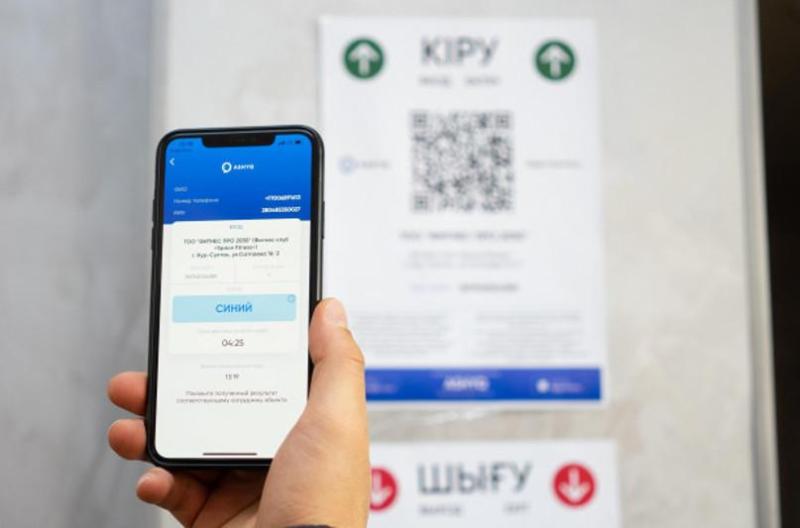Kazakhstan is testing a new app, Ashyq, to restrict access to businesses depending on the user’s Covid-19 status, indicated by one of four colours. The app, currently in its testing phrase, has met with criticism online.
This article was originally published on Novastan’s French website on 17 February 2021.
Kazakhstan’s government is planning to restrict public places to people who are not carrying Covid-19 by using a new mobile application, Ashyq, the Kazakh news agency Kazinform reports.
Want more Central Asia in your inbox? Subscribe to our newsletter here.
This mobile app will determine, through a four-colour system, whether or not a visitor can enter a specific business.
Access restricted to “blue” and “green” citizens
As Kazinform reports, users must sign up on Ashyq with their national personal identification number. The app, connected to data from the ministry of health, has access to the user’s official immunity status.
A colour is then assigned to the user: green if a negative PCR test has been performed in the last three days; blue if not, and the individual is not registered as someone having been in contact with infected people; yellow for people who are designated in the database as contact cases; red if the user is registered with a positive result for Covid-19. These statuses are temporary as they evolve with each person’s health status development.
In turn, the participating businesses will each receive a QR code. Each person seeking to access the facility will first have to scan this code upon entering the premises. The screen will display the immunity status of the customer. Only the individuals who are not listed as “having been in contact with infected people” or “Covid-19 positive” will be able to access the facility.
Pilot phase
This project was launched a few days before the official kick off of the vaccination rollout in Kazakhstan, on 1 February. Although the app was launched shortly before the vaccination campaign, being vaccinated is not a factor in the colour attribution.
The app is currently being tested by around 40 local businesses, in Almaty, Karaganda and in the capital Nur-Sultan, the health minister Alexei Tsoi specified on 10 February. These include cinemas, fitness centres and spas. While this solution is officially deemed to run on a “non-mandatory”, “voluntary” basis, the authorities claim that the goal is to lift opening restrictions for some 13,000 businesses brought to a standstill by the health crisis.
Read more: Central Asia in 2020: the year in review
Alexei Tsoi explained he drew inspiration from South-East Asian countries that have already implemented QR scans at store entrances. Malaysia, in particular, has had such a system since May, as reported by the French public radio RFI, and South Korea since June. As the minister mentioned, Ashyq was developed by a Kazakh company.
The authorities believe that the application will create conditions for “a safe environment” without necessarily tracking people’s movements.
A controversial project
The government also wants this system to work without a smartphone. “In the absence of a smartphone, the application has a feature for employees who control the entrance to the premises. They will be able to check the status of the visitor by means of the IIN or by scanning the barcode located on the ID card”, explained the press service of the Ministry of Digital Development.
The results of the pilot project will make it possible to determine the future terms of replication of the mobile application for entering other public places such as restaurants. The government has however stated that they were not planning to include public transportation, shopping centres and public markets to the project, specified Kazinform.
In the meantime, this project is causing online uproar in Kazakhstan. The Kazakh media outlet KP.kz reported outraged comments on 17 February, with some users denouncing a violation of constitutional rights. Toppress.kz, another Kazakhstani media outlet, also reports very negative reviews on Apple’s app store.
Elliot Obadia
Novastan.org
Translated by Joana da Silva Pina
For more news and analysis from Central Asia, follow us on Twitter, Facebook, Telegram, Linkedin or Instagram.
 Covid-19: Kazakhstan to use colour-coded system through new app
Covid-19: Kazakhstan to use colour-coded system through new app 



